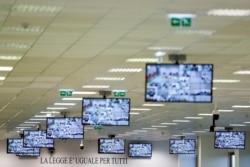As one of Italy’s best-known news anchors, Massimo Giletti knows that reporting on the Mafia comes with risks. But even now he is adjusting to how coverage of organized crime has impacted his life.
For the past year, the Rome-based journalist has had round-the-clock police protection. Two officers accompany him everywhere — even when out reporting.
“It’s very difficult. It’s strange. Because you are not free to move, to speak with people. Always two people around you. So it’s very difficult,” Giletti told VOA.
Italy assigned the protection to Giletti in 2020 after audio surveillance of Filippo Graviano, a crime boss imprisoned in Parma, alerted authorities to a possible threat.
Graviano, one of the leaders of Sicily’s Cosa Nostra, was heard saying that Giletti was a nuisance, Italian daily La Repubblica reported.
The journalist, who frequently reports about the Mafia on his LA7 TV show “Non è l’arena,” appeared to have caught the attention of the jailed crime boss when he criticized plans to release more than 300 convicted organized crime figures and associates as part of an effort to reduce prison populations during the coronavirus pandemic.
What bothered Graviano most, according to La Repubblica, was Giletti reading on air the names of all those released.
While the police protection is welcome, Giletti says he is under a huge emotional strain.
With constant bodyguards, his way of reporting has changed drastically and the journalist said he still fears for his life every time he leaves his house or sees someone near his property.
All it takes for the Mafia to act is a single moment, for someone to be caught off guard.
Threats to journalists who cover organized crime comes with the territory in some parts of Italy.
More than 80 journalists reported being threatened in 2020, and around 20 have been assigned police protection after receiving serious threats, according to a U.S. State Department report released in March.
Federico Varese, a professor of criminology who specializes in the Mafia at the University of Oxford, said that organized crime networks view journalists as a threat.
While killings are less common, intimidation remains high, Varese told VOA.
“We are seeing pressures, we are seeing intimidation. Recently there was a journalist in Syracuse whose car was burned. Another case, also in Sicily, a journalist was attacked and left disabled by the Mafia,” Varese said.
The attack in Syracuse took place in 2019, when a car belonging to crime reporter Gaetano Scariolo was set on fire. The second Sicily case Varese cited is a 2014 attack on Paolo Borrometi in the city of Ragusa that left the journalist with a permanent injury to his shoulder. Borrometi now has police protection and continues to report on the Mafia for his paper, La Spia.
Watchdog of the system
Journalist Giletti refuses to be silenced by the threats and intimidation.
“The search for truth is something that cannot be given up. Whoever does my job is a watchdog of the system,” Giletti said. “Journalism is not turning your head the other way,"
But that commitment cannot be taken lightly.
"The question we must ask is why those in Italy who deal with the Mafia end up under protection,” Giletti said. “I have large shoulders, I am famous, but there are many very young guys who in Sicily, Calabria, Campania, do the same job as me, write articles and then they are afraid for their lives.”
“This is a very heavy problem of freedom, of democracy, for the press, in Italy,” he added.
Nowadays the Mafia have a lower profile, Giletti said, and fewer people talk about their activities. In addition, there are fewer attacks and assassinations than in the 1980s and ’90s.
The Mafia are still involved in illicit activity, he said, including in Milan and Rome where they handle billions of euros in illegal trade and try to influence the political environment.
With less coverage of organized crime, reporting on the Mafia can be a lonely experience.
“I fought in an absolute solitary battle when they released (Franco Cataldo),” Giletti said, referring to a man convicted in 1997 for his role in the killing of a teenage boy. “In spring 2020, that man returned home. Then later, thanks to our battle, he had to go back to jail.”
Cataldo was serving a life sentence for his role in the kidnapping and killing of 14-year-old Giuseppe Di Matteo. The teenager was kidnapped in November 1993 after his father collaborated with police about the Cosa Nostra. He was held for more than two years before the Mafia killed him in early 1996 and disposed of his body in acid.
“If there had been other colleagues like me, perhaps I would not have remained so isolated, because they would have had to put everyone under protection,” Giletti added.
Generally, the reporters who are deemed at risk have received threats online or via social media, according to Rome’s Anti-Mafia Commission.
University professor Varese said that with the Mafia no longer as powerful and influential as it once was, the networks have less ability to carry out extreme acts of violence.
“I think these organizations are not as strong as they used to be, so they are not capable of taking these massive decisions,” Varese said.
Even under protection, Giletti says, if the Mafia wants to kill him, it will. But Giletti says he will continue. The only way to defeat the Cosa Nostra is increasing awareness so people understand that the Mafia is no longer as powerful as it was, he says.
“We must invest in schools, in those territories where, unfortunately, it is more difficult for a child to grow, because of a culture that is difficult to break: the omertà or code of silence,” he said. “If we delude ourselves by thinking the police and magistrates can defeat the Mafia, we will make a serious mistake.”












